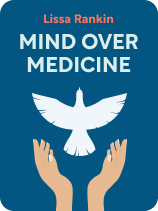

This article is an excerpt from the Shortform book guide to "Mind Over Medicine" by Lissa Rankin. Shortform has the world's best summaries and analyses of books you should be reading.
Like this article? Sign up for a free trial here.
Why do so many people feel lonely and isolated despite being more connected than ever before? How does loneliness affect one’s mental health?
Loneliness not only has deleterious effects on our mental health, but it also affects our physical health by stimulating the stress response. This, in turn, sets off a chain of reactions that can lead to physical illness.
Here’s how loneliness and chronic isolation can make you sick.
Loneliness Exacerbates Stress and Disease
Long-term loneliness is one of the primary triggers of anxiety and depression, which repeatedly induce your body’s stress response and cause or exacerbate illness. This is because when we face the daily struggles and tragedies of life on our own, it’s easier to feel overwhelmed. And in the developed world, loneliness is becoming more and more common. Rankin says that research shows that 10-30% of people (presumably in developed countries) feel lonely most of the time.
Furthermore, chronic isolation and loneliness increase our likelihood of disease and mortality. Rankin references one study where participants with the fewest social ties had higher rates of cancer and were three times more likely to die from the cancer over a nine-year period than other participants. This study controlled for factors like pre-existing health conditions, financial status, race, age, and so on.
| We’re More Connected Than Ever…Or Are We? In Lost Connections, Johann Hari argues that our lack of meaningful connections due to modern lifestyles are major drivers of anxiety and depression, and therefore, our medical model of psychiatric care is insufficient for treating the problem at its root. His solutions mostly focus on large-scale systemic social changes, but he also suggests that on an individual level, it’s important to recognize that making online connections isn’t enough. Modern humans tend to think we’re more connected than ever because of our online networks and constant interactions, but despite this, levels of anxiety, depression, and loneliness are higher than ever. This clearly indicates that we need to actually get out and talk to people, face to face, as our evolutionary urge to be in connection with others depends on that physical presence. |
On the other hand, Rankin says if you surround yourself with people that make you feel accepted, loved, and uplifted, you’ll feel relaxed and promote healing. To demonstrate the healing power of positive support, Rankin references a study that observed the influence of relationships on the recovery of 3,000 nurses with breast cancer. Those who had 10 or more friends supporting their recovery were four times less likely to die from their diagnosis. In the second half of this guide, we’ll share tips on how to surround yourself with the right people to help you relax and heal.
| Healthy Relationships Contribute to Healing In the study Rankin references, the type of relationship that was most predictive of a patient’s cancer survival was having 6 or more children, then having 10 or more friends, and then having 10 or more relatives. Interestingly, being married and having ties to your community or a religious group were not related to increased cancer survival. The type of support patients received from these relationships was not measured (emotional, financial, informational, and so on), but a similar study showed that cancer patients with a lot of emotional support are half as likely to die from their disease as those with low emotional support. This emotional support was measured according to how comfortable patients felt talking to their social networks about their disease or other personal problems. |

———End of Preview———
Like what you just read? Read the rest of the world's best book summary and analysis of Lissa Rankin's "Mind Over Medicine" at Shortform.
Here's what you'll find in our full Mind Over Medicine summary:
- How a healthy mind can heal physical ailments
- How our beliefs, our relationships, and our jobs affect our health
- How to improve the most important parts of your life






